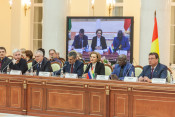
A follow-up conference summarizing the results of the 3 years Russian-Guinean cooperation has started its work in the Presidential Library
A conference summarizing the results of the three-year Russian-Guinean cooperation, during which the epidemiologists of both countries are reviewing the results of a joint struggle against the Ebola virus and other dangerous tropical infections, started its work today in the Presidential Library. As it was emphasized at the conference, this is a high level cooperation, where the main objective is a salvation of human lives.
At the end of 2017 it turned 4 years since the beginning of the epidemic caused by the Ebola virus in the Republic of Guinea. Then the Russian Federation among the first responded to an appeal of the world community to consolidate the efforts to fight the new threat. Russia sent mobile anti-epidemic units to the African republic and provided the necessary assistance in the most difficult period of the epidemic. A field hospital was deployed, work on infection diagnostics began, physicians from the Research Institute of Applied Biology were interning in Russia, and a program of testing the Russian vaccine against Ebola with the participation of volunteers was launched in Guinea.
The “Program of Russian-Guinean cooperation in the field of studying epidemiology, prevention and monitoring of bacterial and viral infections in the Republic of Guinea in 2015-2017,” led by the Federal Service for Supervision of Consumer Rights Protection and Human Well-being was formed in accordance with the order of the Government of the Russian Federation.
The program provided three main areas of work: the organization of a powerful up-to-date laboratorial base in the Republic of Guinea, the training of national personnel in epidemiology, virology and bacteriology, as well as assuring a support of joint Russian-Guinean scientific projects. The latter were not confined to works connected only with the epidemic of the disease caused by the Ebola virus, but were directed, especially in the post-epidemic period, to the study of several infections. These include viral hepatitis A, B, C and E, about the prevalence of which in the region there is a very few information in the world literature, intestinal infections, as well as epidemic roseola, an outbreak of which was registered between January and May 2017.
Currently, cooperation between the two countries is led in 11 areas, covering the most dangerous bacterial and viral infections. As it was pointed at the conference, “more than 200 Guinean medics have undergone internships headed by Russian specialists, many of them have traveled to Russia.”
The main results of the three-year fruitful cooperation will be presented within three days. At the conference, which will last at the Presidential Library from December 5 to December 7, 2017, the staff of the Research Institute of Applied Biology of Guinea, the medical service of the United Company RUSAL will appear with the speeches, including some Russian scientific organizations that participated in the implementation of the program: the “Microbe” Russian Research Anti-plague Institute, the Central Research Institute of Epidemiology, the State Scientific Center for Applied Microbiology and Biotechnology, the “Vector” State Scientific Center of Virology and Biotechnology and the St. Petersburg Institute of Epidemiology and Microbiology named after Pasteur.





